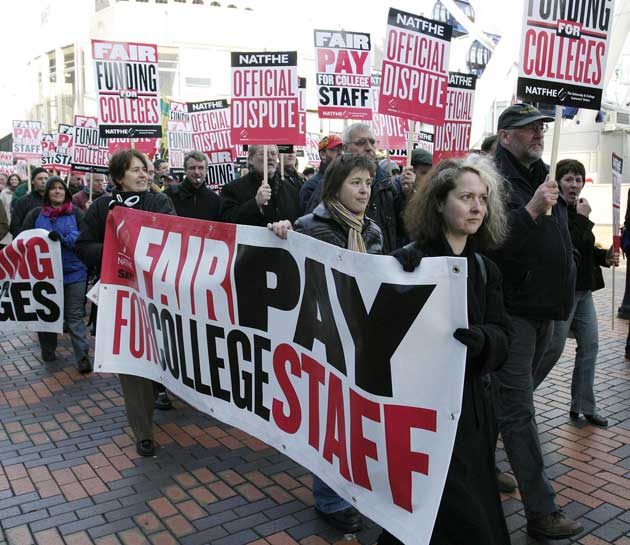Everybody out: Lecturers gear up for strike action this summer
As lecturers gear up for industrial action over job cuts, students fear they may end up being the victims this summer.

A summer of discontent looms in universities as the lecturers' union flexes its industrial muscle – this time over job cuts. The University and College Union (UCU) is warning that higher education could be brought to a standstill as a result of a strike ballot this week, which may mean that students are stuck in exam chaos, faced with being unable to get their marks, or even to graduate.
Back in 2006, British universities were gripped by a damaging dispute which hit students and meant that some couldn't sit their exams. It ended in the nick of time and a generous pay rise followed – a total of more than 15 per cent over three years. This time the cause is different, if only because Britain is in recession, which may explain why the UCU is focusing on jobs rather than pay.
Certainly that's what the employers think. "Members of the UCU may be genuinely confused," says Jocelyn Prudence, chief executive of UCEA , the Universities and Colleges Employers Association. "They will ask 'Is this about pay or is it about a no-compulsory redundancy agreement?'"
The confusion arises because initially the union started off agitating about pay as much as jobs in the current pay round. It asked for an 8 per cent pay rise and resolved to hold a strike ballot after the employers failed to make a pay offer by the union's deadline of 20 April or to formulate a no-redundancy agreement.
The employers say they were taken aback by this because it came three weeks into an agreed eight-week timetable for pay negotiations and that it had made clear an offer would be set out on 27 April. The offer, when it came last week, was 0.3 per cent, which UCEA says is "realistic, responsible and credible" given the cuts now hitting universities. All the university unions have, however, rejected it as "derisory".
The lecturers stuck to their commitment to a strike ballot, giving the job cuts threat as the reason. According to UCU, there is nothing to prevent the employers negotiating a national agreement to prevent job losses. The employers, however, disagree.
"The issue of a categoric assurance on job losses is not within our gift," says Prudence. "How universities balance their books is a matter for them, not for any group nationally to decide. It's a bit like the CBI giving a no-redundancy assurance for the whole of the private sector. It's not possible."
At the same time, she made clear that most universities looking at job reduction would be considering redeployment, recruitment freezes and voluntary redundancies rather than compulsory measures.
UCEA also says that the lecturers are hyping up the job cuts to ensure support in their ballot. Matt Waddup, the UCU's national head of campaigns, rejects these arguments. It is factually wrong to say that an agreement on an issue like no-compulsory redundancies can't be negotiated nationally, he says.
"I'm unaware of any legitimate reason why universities cannot agree some national principles in response to an issue they themselves first raised – that 100 institutions are planning cuts," he says. "What UCEA is really saying is not that they can't but they don't want to – and that is an inadequate response to thousands of UCU members who face losing their jobs."
It is also wrong to say that universities won't make people compulsorily redundant because institutions like London Met and Cardiff have said they will, he maintains. Moreover the employers' own survey shows the scale of what could happen – 67 per cent of higher education institutions are planning to reduce staff, says Waddup. In negotiations, the employers also said that up to 100 institutions were planning to make cuts, he maintains. "It was this announcement that made us seek a national agreement, as any responsible union would do faced with cuts in two or three of the institutions where it has members," says Waddup.
Nevertheless, the employers believe this is an engineered dispute and that UCU activists are spoiling for a fight. There is suspicion that members of far-left groups are making common cause with old-fashioned leftists to oppose the employers, using the exams issue as their weapon. "UCU just seems to want to be in permanent opposition," says one observer. "Many of their activists are not connected to the real world at all."
Waddup does not reply to questions about the internal politics of UCU. Nor does he comment on whether the dispute is about increasing membership figures or whether the union is really serious about strike action. But he does say that all the other higher education unions have joined UCU in calling for a national agreement on job security. The employers reply that, although the other unions are supporting the UCU on this issue, they are not going on strike over it and are staying at the negotiating table.
UCEA has written to UCU asking it to suspend the ballot, but it has refused. Students are dismayed. Wes Streeting, president of the NUS, says: "Given the effects of the current economic climate on graduate jobs, students need industrial action like a hole in the head." As the supplement went to press, no settlement was in sight.
Join our commenting forum
Join thought-provoking conversations, follow other Independent readers and see their replies
Comments
Bookmark popover
Removed from bookmarks